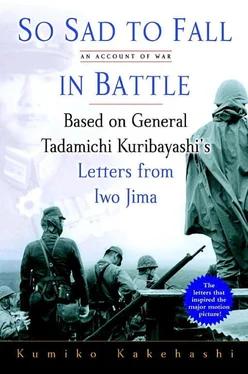Tada Minoru, a graduate of the Naval Preparatory School and a survivor who was sent to Iwo Jima as a lieutenant, wrote about his memories of Kuribayashi in his book Nanimo Kataranakatta Seishun ( Youth That Could Not Have Its Say ).
One day, out of the blue, there was an inspection of our emplacement by the commander in chief. Captain Wachi himself was driving the car. It was Lieutenant General Kuribayashi, commanding officer of the 109th Division, who had just taken up his post as leader of the Ogasawara Army Corps.
“Southern coast machine-gun emplacement. Weapons and personnel all in order.”
As Tada made his report, Captain Wachi, who was standing nearby, added, “Tada is the emplacement commander.”
“This is a difficult place you’ve got here.”
Lieutenant General Kuribayashi took a good look at the gun emplacement and at the beach directly below.
“You were at the naval school, Lieutenant Tada?”
“Yes, sir. I was.”
“I’ll be asking a lot from you. I’m depending on you to stand firm.”
As Lieutenant General Kuribayashi said this he moved on to the next gun emplacement. The expression in his eyes was kind and stern at the same time.
In the documentation on the American side, there is an account that notes with surprise that the majority of the Japanese who became prisoners of war had seen Kuribayashi face-to-face. On a front where more than twenty thousand soldiers were stationed, it was hard to conceive that the greater part of them should have met their commander in chief.
In a place where living conditions were as harsh as Iwo Jima, morale would quickly sink if there was insufficient contact between the officers and the men. Even if the ordinary soldiers never actually got to see his face, word getting around that the commander in chief—that lofty, superior being—was inspecting the defenses on a daily basis helped to boost their spirits.
It is estimated that the underground defenses were seventy percent complete when the American landing operation got under way in February 1945. Kuribayashi was no doubt frustrated that he was not vouchsafed a little more time and a greater quantity of materials, but the work proceeded surprisingly smoothly in light of all the difficulties involved.
“It’s a miracle that the soldiers could stand the stress of spending eight whole months on an island with no alcohol, no entertainment, and not a single woman,” James Bradley told me.
Major Fujiwara Tamaki revealed what he felt about his time on the island.
There was absolutely nothing on Iwo Jima and it was a dreary place. Even if we were given money there was nothing we could buy; there were only military personnel there; on a fine day you could more or less make out Kita Iwo Jima, but aside from that there was nothing but sea. After about six months, I thought I was going to go crazy.
The sense of isolation on Iwo Jima only increased the stress the soldiers had to put up with as they waited for the American assault, grinding away at their exhausting tasks, short of water and food. Nonetheless, the military discipline of the Iwo Jima garrison was maintained over the eight months that they worked day and night training and constructing defenses, while avoiding air raids and naval bombardments.
AS PROPOUNDED IN THE “courageous battle vows,” Kuribayashi’s strategy was to ask the soldiers to die for him after fighting an agonizing battle. In a sense, that battle actually started long before the American landing.
A commander in chief sends the soldiers he commands off to their deaths based upon his personal judgment. It is an almost intolerably heavy responsibility for anyone to bear. High-ranking military men who find themselves in this position always try to find a way to live with the burden.
There are some who see their own superior abilities as justification for sending soldiers to their deaths; other leaders, like Nogi Maresuke, cope by applying standards of superhuman stoicism to themselves; most common, perhaps, are those who seek support from religious belief.
Kuribayashi fits none of the above categories: he was a realist and a rationalist. Letters like this one, which he sent his wife, Yoshii, on January 28, 1945, show that he was not interested in leaning on religious belief.
It’s probably due to the strength of the faith of your grandmother in Higano [Higano, in Nagano Prefecture, was the hometown of Kuribayashi’s wife] that she managed to get through the air raid without being afraid by chanting “Dainichi Buddha.”
But bombs and incendiaries fall quite randomly anywhere and everywhere, so faith is no use at all. Her faith may help keep her spirits up and that’s all well and good, but she should be very careful not to come to grief by neglecting the various mental and practical preparations that air raids demand.
I know from our experience here that the people who get complacent and aren’t serious about taking shelter are the ones who end up getting killed or wounded.
SO HOW DID KURIBAYASHI RECONCILE HIMSELF TO HIS ROLE?
Kuribayashi knew that he would have to force his soldiers to die a cruel death—and that was the reason he made up his mind to stay with them on Iwo Jima. He refused to exercise his command from Chichi Jima, which was safe and had water and food in abundance. Instead, he went to Iwo Jima and did not leave the island again until he died there.
The defense of the Ogasawara Islands, including Iwo Jima, had been in the hands of Major General Ôsuka Koto’o, the Ogasawara Region group commander, until Kuribayashi’s arrival. Ôsuka had exercised his command from Chichi Jima, and he naturally assumed that Kuribayashi would do the same. Indeed, it was not until the battle had progressed to a certain point that even the Americans realized that the commander in chief was in direct control on an island that their preliminary air raids and naval bombardments had transformed into so much scorched ground.
According to Kuribayashi’s son, Tarô, the family discovered that Kuribayashi was in Iwo Jima in the fall of 1944, when one of his subordinates, who was briefly in Tokyo for business, dropped into the house in Higashi Matsubara. Kuribayashi’s wife would also have preferred him to be in Chichi, rather than Iwo Jima, and seems to have sent him a letter that said, “Adjutant Fujita’s father says Chichi Jima is safer, too.” Kuribayashi replied to her on November 2, 1945:
You tell me that Fujita’s father said that Chichi Jima was likely to be safer than Iwo Jima. I think he’s right. But to protect Japan it’s much more important for me to be in Iwo Jima—and that’s why I’m here. I haven’t the time to think about whether I’m safe.
—
KURIBAYASHI WALKED EVERY inch of the island, inspecting the construction of the defensive positions; he took the lead in efforts to save water; he even cultivated a vegetable patch. He refused any gifts of food and ate the same thing as his men three times a day. He imposed a regime on himself that made sure he experienced all the discomforts of the ordinary soldiers.
He made himself a part of the day-to-day life of his men, a comrade who shared their “life with no tomorrow.” In the run-up to the American assault, Kuribayashi’s resolve was to live the same life as his twenty thousand men.
—
The evening sky is clear,
And the autumn wind blows.
The moon casts its shadows
As the bell-ring crickets chirp.
SHE STARTED SINGING THE SONG IN A THIN BUT BEAUTIFUL VOICE. The sweat stood on her delicately powdered forehead.
“The young recruits used to sing this song as they walked back to base after they’d finished digging the underground bunkers. Did you know that there were sixteen-year-old soldiers on Iwo Jima?”
Читать дальше












